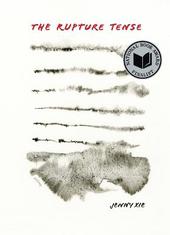
|
The Rupture Tense: Poems
Paperback / softback
Main Details
| Title |
The Rupture Tense: Poems
|
| Authors and Contributors |
By (author) Jenny Xie
|
| Physical Properties |
| Format:Paperback / softback | | Pages:120 | | Dimensions(mm): Height 229,Width 165 |
|
| Category/Genre | Poetry |
|---|
| ISBN/Barcode |
9781644452011
|
| Classifications | Dewey:811.6 |
|---|
| Audience | |
|---|
|
Publishing Details |
| Publisher |
Graywolf Press,U.S.
|
| Imprint |
Graywolf Press,U.S.
|
| Publication Date |
20 September 2022 |
| Publication Country |
United States
|
Description
Shaped around moments of puncture and release, The Rupture Tense registers what leaks across the breached borders between past and future, background and foreground, silence and utterance. In polyphonic and formally restless sequences, Jenny Xie cracks open reverberant, vexed experiences of diasporic homecoming, intergenerational memory transfer, state-enforced amnesia, public secrecies, and the psychic fallout of the Chinese Cultural Revolution. Across these poems, memory-historical, collective, personal-stains and erodes. Xie voices what remains irreducible in our complex entanglements with familial ties, language, capitalism, and the histories in which we find ourselves lodged. The Rupture Tense begins with poems provoked by the photography of Li Zhensheng, whose negatives, hidden under his floorboards to avoid government seizure, provide one of the few surviving visual archives of the Chinese Cultural Revolution, and concludes with an aching elegy for the poet's grandmother, who took her own life shortly after the end of the Revolution. This extraordinary collection records the aftershocks and long distances between those years and the present, echoing out toward the ongoing past and a trembling future.
Author Biography
Jenny Xie is the author of Eye Level, a finalist for the National Book Award and the PEN Open Book Award and winner of the Walt Whitman Award of the Academy of American Poets. She teaches at Bard College and lives in New York City.
Reviews"Luminous. . . . [The Rupture Tense] is a devastating master class in subtlety."--Publishers Weekly, starred review "Jenny Xie's The Rupture Tense, like the photographs of Li Zhensheng, invites a powerful reckoning with the history of the Cultural Revolution. Her stunning language enacts a journey through an emotional landscape where we listen to the pain of the dead and the grief of those who inherited the terrible stories. These disquieting and gorgeous poems, bodies of memory, lessen 'the distance between the seen and the known.'"--Rigoberto Gonzalez "The Rupture Tense is a masterwork of witness. Jenny Xie preserves and visualizes a suite of vanishing memories with language so exact and precise it could sharpen a razor. Excavating long-buried legacies of the Cultural Revolution through her lyrical cascades, Xie employs stereoscopes, portable dioramas where the reader peeks through, revealing a tiny theater for the eyes. These poems brilliantly capture the discomfort and wonder of returning home to a country shorn of memory, where the soiled corners of the past remain all too evident. The Rupture Tense doesn't just haunt--it pulls me back into singular, urgent moments until I live inside them, shaken and transformed."--Sally Wen Mao "With brilliant inquiry and imagination, Jenny Xie writes into what has vanished from the archives of the Cultural Revolution. . . . The Rupture Tense is innovative, stunningly precise, and heartbreaking."--Cathy Park Hong "[The] poet not only peeks at her family's past and their country's history, but also explores the subversive power to be found in examining what has been concealed or overlooked [...]"--Han Zhang, The New York Times "Aphoristic and elegant, The Rupture Tense articulates a lucid but challenging wisdom from the interstices of our inner lives [...]"--David Woo, Harriet Books "Line after line, sentence after sentence, whenever I encounter the poetry of Jenny Xie I find myself stuck in small breathless moments of wonder at what the hell she just did."--Literary Hub "Xie is a master of cutting wit, and she uses verb tenses and parts of speech as an extended metaphor for things left unsaid."--Joanna Acevedo, Hong Kong Review
|